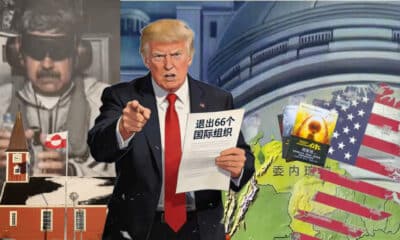China Memes & Viral
Before the Xi-Biden Meeting: Chinese Social Media Views of American President Biden
From being dubbed the ‘Sleepy King’ to being hailed as ‘Revive the Country’ Biden, the US President is perceived in various ways on Chinese social media.
Published
2 years agoon
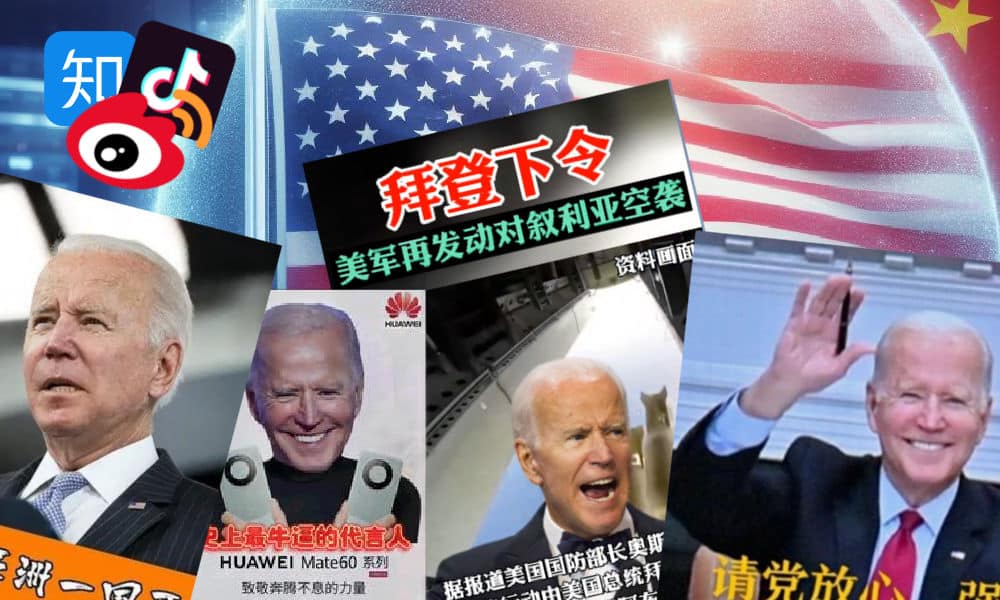
From positive portrayals by official channels to online banter and critical voices discussing Biden’s global policies and his health, there are various sentiments on Chinese social media surrounding US President Joe Biden ahead of the significant Xi-Biden meeting.
“It is a meeting the whole world will be watching,” one Weibo blogger wrote. On November 15, Xi Jinping and Joe Biden will meet in California on the sidelines of the APEC summit for their second face-to-face meeting since 2020. The occasion will mark Xi’s first trip to the U.S. in six years.
The topic was reported by official channels on Chinese social media using different hashtags, such as “Sino-American Heads of State Meeting” (#中美元首会晤#) and “What Major Issues Will Be Discussed During the Sino-U.S. Summit?” (#中美元首会晤将沟通哪些重大问题#).
The two leaders are expected to discuss various bilateral and global issues. Although Chinese media described the goal of the meetings in very general terms, saying Xi and Biden will talk about “strategic, global, and directional issues concerning China-U.S. relations as well as major matters related to world peace,” US officials said that topics will include the Israel-Hamas war, Taiwan, and the war in Ukraine.
While discussions of this nature, particularly on geopolitical matters, are typically closely monitored on Weibo—especially when President Xi is involved—there are still some online threads where netizens express optimism, viewing the meeting as a positive step for the stability and future of US-China relations.

A Terra Cotta warrior embraces the Statue of Liberty. Image circulating on WeChat in the days leading up to the Xi-Biden meeting.
Many of these optimistic sentiments stem from a response to an op-ed published by People’s Daily. The op-ed argues that maintaining stable relations between the US and China, fostering peaceful coexistence, is crucial for global future and world peace.
However, discussions about Biden on Chinese social media aren’t always this positive and restrained.
Biden Sleepy King
During and after the 2020 American presidential elections, there were numerous discussions on Chinese social media about ‘Trump versus Biden.’ In the eyes of many, it was a contest between the ‘King of Knowing’ (懂王) and the ‘Sleepy King’ (睡王).
These nicknames were attributed to Trump, who frequently boasted about his unparalleled understanding of various matters, and Biden, who gained notoriety for being older and tired. Viral videos, some manipulated, showed him nodding off or seemingly disoriented.
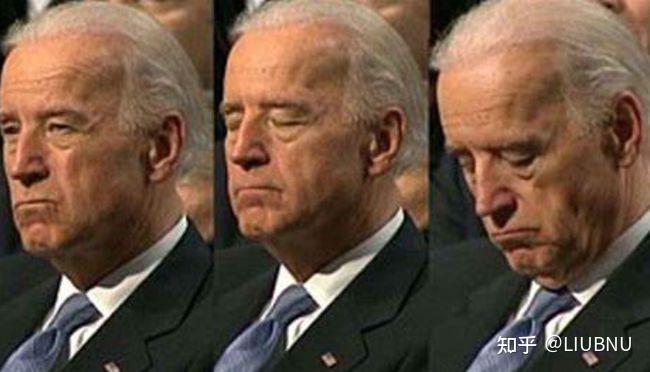
Image of ‘Sleepy King’ aka ‘Sleepy Joe Biden’ shared on Chinese Q&A platform Zhihu.com.
When Biden became president, many Chinese social media users cheered and hoped that this new experienced president, who had also faced family and personal tragedies throughout his political career, would contribute to an improvement in Sino-American relations. They expected that Biden, different from Trump, would be less confrontational and more predictable, albeit more “boring” as well.
However, as we discussed in this 2020 article, various Chinese political commentators suggested that the Biden era would not necessarily signify better relations between China and the US, and that the shift of American leadership would have no intrinsic meaning for Sino-American relations at all.
Revive the Country Biden
In recent years, Biden has come to be referred to with the Chinese nickname “Revive the Country Biden” (Bài Zhènhuá 拜振华), also translatable as ‘Thriving China Biden’. This nickname already circulated online since 2020 and matches with one that was previously given to former President Trump, namely that of “Build the Country Trump” (Chuān Jiànguó 川建国).
The idea behind these humorous monikers is that both Trump and Biden are benefitting China by doing a poor job in running the United States and dealing with China.
For instance, citing national-security concerns, both the Trump and Biden administrations have implemented policies and sanctions targeting Huawei. But despite measures to cut the Chinese tech giant off, Huawei launched its own operating system (HarmonyOS) in 2019 and earlier this year, with the launch of its Mate60Pro, introduced its own nanometer (N+2) chip, designed by Huawei’s chip division HiSilicon and manufactured by China’s largest chip vendor, SMIC.
Chinese social media users therefore joke that ‘Revive the Country Biden’ and ‘Build the Country Trump’ are actually the best Huawei brand ambassadors by pushing the Chinese tech brand to the next level.
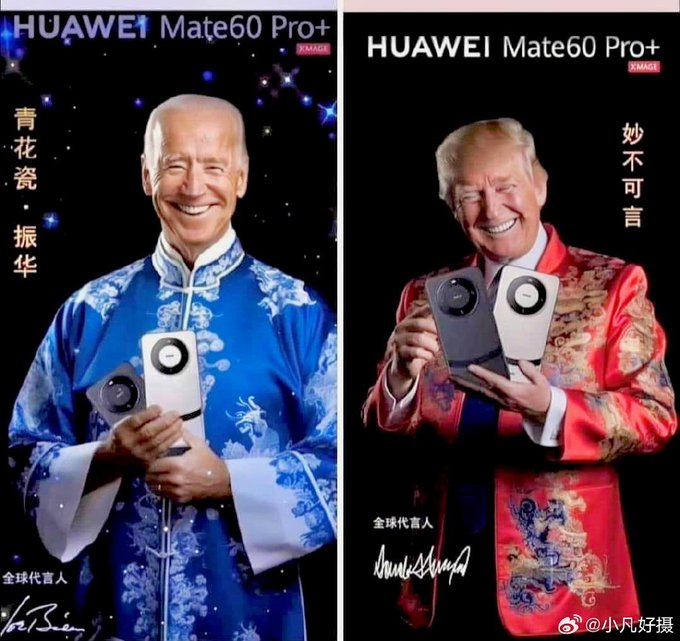
An AI-generated image shows ‘Revive the Country Biden’ and ‘Build the Country Trump’ as Huawei brand ambassadors.
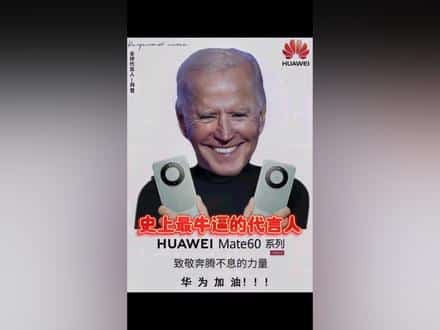
Biden the Huawei brand ambassador, via Douyin.
When Donald Trump recently mocked how President Biden often seems to be disoriented on stage, the video was picked up by a few popular Chinese bloggers and set off dozens of jokes about the absurdity of the situation.
After President Biden was filmed as he seemed unsure what to do during the November 11 wreath-laying ceremony at Arlington Cemetery, footage also went trending on Chinese socials. Some people called him a “robot” who needed new batteries.
Earlier this year, Biden also went viral in China when, while delivering a speech to the Canadian parliament, he accidentally said he “applauded China for stepping up.” He quickly corrected himself and clarified he meant to say ‘Canada’ instead of ‘China,’ but Chinese web users joked that it was a Freudian slip and he actually said what he meant.
But besides Biden’s restrictive measures and sanctions on China and a string of bizarre, confused statements and behaviors, there are more reasons why Chinese netizens have been calling him ‘Bai Zhenhua‘, ‘Revive the Country Biden.’ After all, in contrast to how Trump consistently framed China as a threat and competitor, Biden has often downplayed the threat China poses to the US (“They’re not bad folks, folks,” he said in 2019, “they’re not competition for us”).
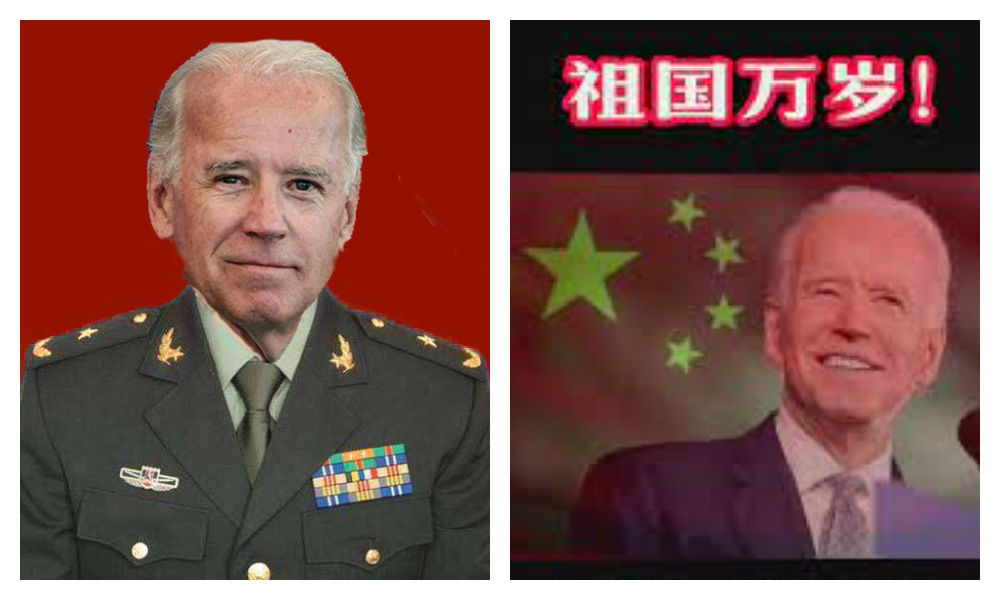
Chinese memes about ‘Bai Zhenhua’, ‘Revive the Country Biden.’
Joking about his words, some netizens even called him ‘Comrade Bai Zhenhua.’
The Different Faces of Biden
Jokes aside, there are also more serious and negative discussions about the role played by Biden, especially in this time of global unrest and Israel-Hamas war.
Headlines such as Biden personally saying there is “no possibility” of a cease-fire in the Gaza Strip or Biden ordering new airstrikes in Syria to retaliate for attacks on U.S. bases, reported by Chinese media, attract a lot of views on Weibo and Douyin.
Although there are also discussions about the supposed limited power Biden actually has, with some calling him one of America’s weakest presidents, he is still seen as the face of the White House, the representation of Washington.

Cartoon depicting Biden as evil, by @插画杨权, 2020.
At a time when anti-American sentiments are on the rise, some netizens view Biden as embodying the negative stereotypes prevalent on social media about the United States or the Western world in general.
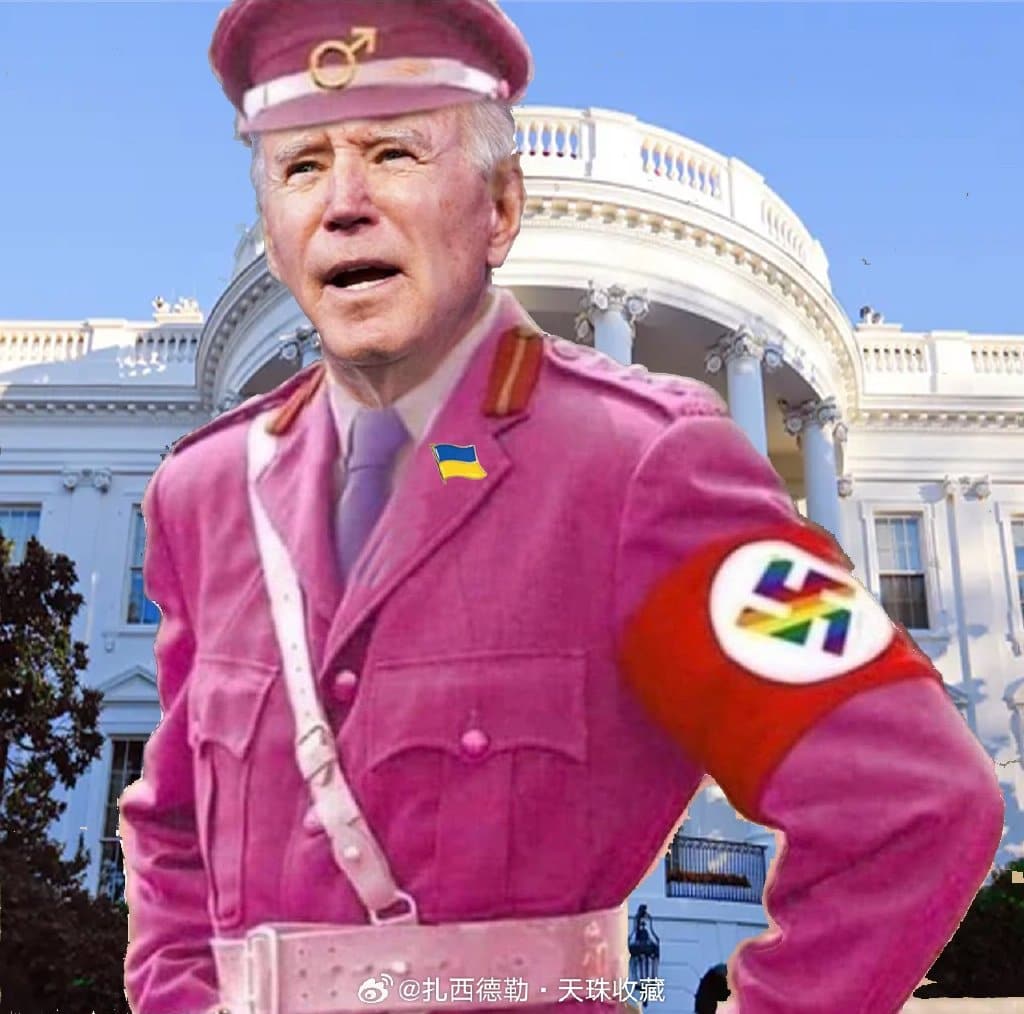
Photoshopped image of Biden posted on Weibo (@扎西德勒·天珠收藏 ) in light of Biden ordering new airstrikes on Syria.
Within this context, at a time when the majority of Chinese social media users express pro-Palestinian sentiments, Biden is blamed for contributing to or even causing global suffering. Some netizens label him as the “devil” or associate him with a supposed larger geopolitical evil circle (“The wicked United States, Japan, the United Kingdom, and Israel… they’re enemies of humanity,” one Douyin user writes).
But not all are so harsh, and some think Biden’s old state and mental state are also to blame for his political decisions. As one Weibo user writes: “After all, Biden is quite old, his health is not particularly good. With so many responsibilities, it’s inevitable that there are things he cannot fully grasp, hear clearly, or contemplate deeply anymore.”
Meanwhile, it is evident that in the days leading up the Xi-Biden meeting Chinese official channels are promoting more positive portrayals of U.S. leadership on social media, with online discussions being tightly controlled. Some media outlets refer to the meeting as ‘a new chapter’ for Sino-American friendship. A day prior to top-level meeting, Xinhua News shared an image with text endorsing and applauding Sino-American exchanges:
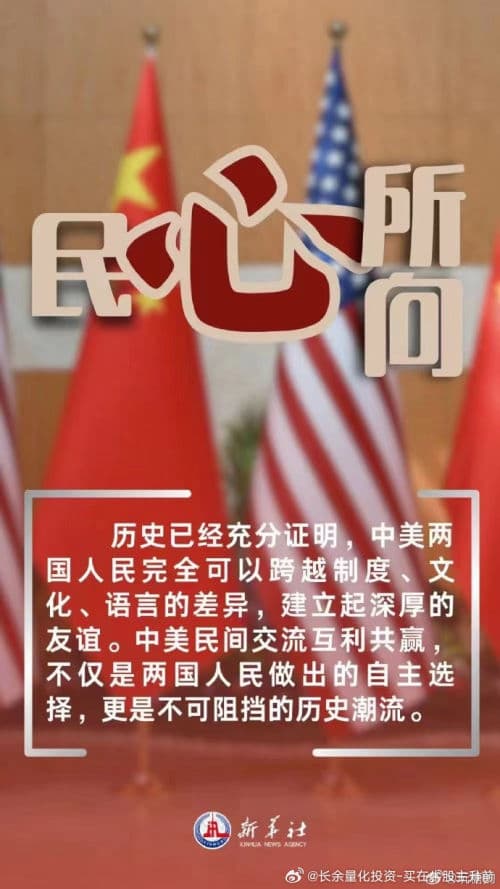
“History has already proven that the people of China and the US can fully overcome their differences in systems, culture, and language to establish a profound friendship. The exchanges between the people of China and America are mutually beneficial. Not only are they [these win-win exchanges] the result of independent choices made by the people of both countries, they’re also an unstoppable historical trend.” (“历史已经充分证明,中美两国人民完全可以跨越制度、文化、语言的差异,建立起深厚的友谊。中美民间交流互利共赢,不仅是两国人民做出的自主选择,更是不可阻挡的历史潮流。”)
The comments below the post were censored, and most other comment sections on posts reporting the significant US-China meeting were also empty. One Weibo user commented: “The anti-American netizens don’t know if it’s okay to criticize them now anymore.”
But it seems that directives from higher up have made it clear. For today, perhaps tomorrow, and who knows about the day after, Biden is not the evil, not the Sleepy King nor Bai Zhenhua; he is now a good friend of China.
By Manya Koetse
Get the story behind the hashtag. Subscribe to What’s on Weibo here to receive our newsletter and get access to our latest articles:
Spotted a mistake or want to add something? Please let us know in comments below or email us. First-time commenters, please be patient – we will have to manually approve your comment before it appears.
©2023 Whatsonweibo. All rights reserved. Do not reproduce our content without permission – you can contact us at info@whatsonweibo.com.
Manya is the founder and editor-in-chief of What's on Weibo, offering independent analysis of social trends, online media, and digital culture in China for over a decade. Subscribe to gain access to content, including the Weibo Watch newsletter, which provides deeper insights into the China trends that matter. More about Manya at manyakoetse.com or follow on X.

China Digital
The “Are You Dead Yet?” Phenomenon: How a Dark Satire Became China’s #1 Paid App
A virtual Viagra for a pressured generation? The real story behind China’s latest viral app.
Published
4 hours agoon
January 14, 2026
From censored joke to state-friendly app, ‘Are You Dead Yet?’ has traveled a long road before reaching the top of China’s paid app charts this week. While marketed as a tool for those living alone to check in with emergency contacts, the app’s viral success actually isn’t all about its features.
It is undoubtedly the most unexpected app to go viral in 2026, and the year has only just started. “Are You Dead?” or “Dead Yet?” (死了么, Sǐleme) is the name of the daily check-in app that surged to the No. 1 spot on Apple’s paid app chart in China on January 10–11, quickly becoming a widely discussed topic on Chinese social media. It has since become a top-searched topic on the Q&A platform Zhihu and beyond, and by now, you may even have noticed it appearing on your local news website.
For many Chinese who first encountered the app, its name caused unease. In China, casually invoking words associated with death is generally considered taboo, seen as causing bad luck. It was therefore especially noteworthy to see state media outlets covering the trend. The fact that the name plays on China’s popular food delivery platform Ele.me (饿了么, “Hungry Yet?”), a household name, may also have softened the linguistic sensitivity.
Beyond the name, attention soon shifted to the broader social undercurrents and collective anxieties reflected in the app’s sudden popularity.
🔹 “A More Reassuring Solo Living Experience”
Are You Dead Yet? is a basic app designed as a safety tool for people living alone, allowing them to “check in” with loved ones. The Chinese app has been available on Apple’s App Store since 2025 and currently costs 8 yuan (US$1.15) to download.
The app is very straightforward and does not require registration or login. Users simply enter their name and an emergency contact’s email address. Each day, they tap a button to virtually “check in.”
If a user fails to check in for two consecutive days, the system automatically sends an email notification to the designated emergency contact the following day, prompting them to check on the user’s safety.

The app was created by Guo Mengchu (郭孟初) and two of his Gen Z friends from Zhengzhou, all born after 1995. Together, they founded the company Moonlight Technology (月境技术服务有限公司) in March 2025, with a registered capital of 100,000 yuan (US$14,300). The app was reportedly developed in just a few weeks at a cost of approximately 1,000 yuan (around US$143).
In the text introducing the Dead Yet? app, the makers write that the app is specifically intended to “build seamless security protection for a more reassuring solo living experience” (“构建无感化安全防护,让独处生活更安心”).
🔹 The Rise of China’s Solo-Living Households
The number of solo households in China has skyrocketed over the past three decades. In the mid-1990s, only 5.9% of households in China were one-person households. By 2011, that number had nearly tripled from 19 million to 59 million, accounting for nearly 15% of China’s households.1,2 By now, the number is bigger than ever: single-person households account for over 25% of all family households.3
These roughly 125 million single-person households are partly the result of China’s rapidly aging society, along with its one-child policy. With longer life expectancies and record-low birth rates, more elderly people, especially widowed women, are living alone without their (grand)children.
China’s massive urban-rural migration, along with housing reforms that have adapted to solo-living preferences, has also contributed to the fact that China is now seeing more one-person households than ever before. By 2030, the number may exceed 150 million.
But other demographic shifts play an increasingly important role: Chinese adults are postponing marriage or not getting married at all, while divorce rates are rising. Over the past few years, Chinese authorities have introduced various measures to encourage marriage and childbirth, from relaxed registration rules to offering benefits, yet a definitive solution to combat China’s declining birth rates remains elusive.
🔹 A “Lonely Death”: Kodokushi in China
Especially for China’s post-90s generation, remaining unmarried and childless is often a personal choice. On apps like Xiaohongshu, you’ll find hundreds of posts about single lifestyles, embracing solitude (享受孤独感), and “anti-marriage ideology” (不婚主义). (A few years back, feminist online movements promoting such lifestyles actually saw a major crackdown.)
Although there are clear advantages to solo living—for both younger people and the elderly—there are also definite downsides. Chinese adults who live alone are more likely to feel lonely and less satisfied with their lives 4, especially in a social context that strongly prioritizes family.
Closely tied to this loneliness are concerns about dying alone.
In Japan, where this issue has drawn attention since the 1990s, there is a term for it: kodokushi (孤独死), pronounced in Chinese as gūdúsǐ. Over the years, several cases of people dying alone in their apartments have triggered broader social anxiety around this idea of a “lonely death.”
One case that received major attention in 2024 involved a 33-year-old woman from a small village in Ningxia who died alone in her studio apartment in Xianyang. She had been studying for civil service exams and relied on family support for rent and food. Her body was not discovered for a long time, and by the time it was found, it had decomposed to the point of being unrecognizable.
Another case occurred in Shanghai in 2025. When a 46-year-old woman who lived alone passed away, the neighborhood committee was unable to locate any heirs or anyone to handle her posthumous affairs. The story prompted media coverage on how such situations are dealt with, but it drew particular attention because cases like this had previously been rare, stirring a sense of broader social unease.
🔹 The Sensitive Origins of “Dead Yet?”
Knowing all this, is there actually a practical need for an app like Dead Yet? in China? Not really.
China has a thriving online environment, and its most popular social media apps are used daily by people of all ages and backgrounds, across urban and rural areas alike. There are already countless ways to stay in touch. WeChat alone has 1.37 billion monthly active users. In theory (even for seniors) sending a simple thumbs-up emoji to an emergency contact would be just as easy as clocking in to the Dead Yet? app.
The app’s viral success, then, is not really about its functionality. Nor is it primarily about elderly people fearing a lonesome death. Instead, it speaks to the dark humor of younger adults who feel overwhelmed by pressure, social anxiety, and a pervasive sense of being unseen—so much so that they half-jokingly wonder whether anyone would even notice if they collapsed amid demanding work cultures and family expectations.
And this idea is not new.
After some online digging, I found that the app’s name had already gone viral more than two years earlier.
That earlier viral moment began with a Zhihu post titled “If you don’t get married and don’t have children, what happens if you die at home in old age?” (“不结婚不生孩子,老后死在家中怎么办”). Among the 1,595 replies, the top commenter, Xue Wen Feng Luo (雪吻枫落), whose response received 8,007 likes, wrote:
💬 “You could develop an app called “Dead Yet?” (死了么). One click to have someone come collect the body and handle the funeral arrangements.”

The original post that started it all. That humorous comment was the initial play on words linked to food delivery app Eleme (饿了么).
Two days later, on October 8, 2023, comedy creator Li Songyu (李松宇, @摆货小天才), also part of the post-90s generation, released a video responding to the comment.
In it, he presented a mock version of the app on his phone: its logo a small ghost vaguely resembling the Ele.me icon, and its interface showing some similarities to ride-hailing apps like Uber or Didi.
In the video, Li says:
🗯️ “Are You Dead Yet?’ I’ve already designed the app for you. (…) The app is linked to your smart bracelet. Once it fails to detect the user’s pulse, someone will immediately come to collect the body. Humanized service. You can choose your preferred helper for your final crossing, personalize the background music for cremation and burial, and even set the furnace temperature so you can enter the oven with peace of mind. Big-data matching is used to connect people who might have known each other in life, followed by AI-assisted cemetery matching for the afterlife traffic ecosystem—you’ll never feel alone again. After burial, all content on your phone is automatically formatted to protect user privacy and eliminate worries about what comes after. There’s a seven-day no-reason refund, almost zero negative reviews, and even an ‘Afterlife Package’ with installment payments. Invite friends to visit the grave and have them help repay the debt. And if not everything turns to ashes properly, or if you’re dissatisfied with the shape of the remains, you can invite friends to burn them again and get the second headstone at half price! How about that? Tempted?”

The original “Sileme” or “Dead Yet” app idea, October 2023.
The video went viral, drew media coverage (one report called the concept and design of the “Are You Dead?” app “unprecedented”), and sparked widespread discussion. Although viewers clearly understood that the idea—one click and someone arrives to collect the body and arrange the funeral—was a joke, it nevertheless struck a chord.
Many saw the video as a glimpse into China’s future, arguing that with extremely low birth rates and a rapidly aging society, such business ideas might one day become feasible. Some people pointed to Japan’s growing problem of elderly people dying alone, suggesting that China may come to face similar challenges. At the same time, it also sparked concerns about increasing social isolation.
Despite its popularity, both the video and the trending hashtag “Dead Yet App” (#死了么APP#) were taken offline. A comedy podcast episode discussing the concept—“Did Someone Really Create the ‘Dead Yet’ App?” (真的有人做出了“死了么”APP?), released on October 10, 2023 by host Liuliu (主播六六)—was also removed.
According to Li Songyu himself, the video went offline within 48 hours “for reasons beyond one’s control” (“出于不可抗因素”), a phrase often used to avoid explicitly referring to top-down decisions or censorship.
It is not hard to guess why the darkly humorous Dead Yet? concept disappeared. And it wasn’t only because of crude jokes or the sensitivities surrounding death.
The video appeared less than a year after the end of China’s stringent zero-Covid policies, which had been preceded by protests. In both early and late 2023, Covid infections were widespread and hospitals were overcrowded. It was therefore a particularly sensitive moment to joke about bodies, afterlife logistics, and people being “taken away.”
Moreover, 2023 was a year in which state media strongly emphasized “positive energy,” promoting stories of heroism, self-sacrifice, and resilience in the face of hardship. It was not a time to dwell on death, and certainly not through humor.
🔹 Why a Censored Idea Became a ‘State-Friendly’ App
In 2025, things looked very different. Just weeks after the current Dead Yet? app was developed, it was released on the App Store on June 10, 2025. Not only was its name identical to the app “introduced” by Li in 2023, but its logo was also a clear lookalike.

The 2023 logo and 2025 “Dead Yet?” logo’s.
Although Li Songyu published a video this week explaining that he and his team were the original creators of the Dead Yet? concept and that they had planned to develop a real app before the idea was censored (without ever registering the trademark), app creator Guo Mengchu has simply stated that the inspiration for their app came “from the internet.”
In the same interview, Guo also emphasized that the app’s sudden rise was entirely organic, with the whole process of “going viral,” from ordinary users to content creators to mainstream media, taking about a day and a half.5
However, the app’s actual track record suggests a much bumpier journey.6 Since its launch, it has been taken down once and was reportedly removed from the App Store rankings three times. Such removals commonly occur due to suspected artificial download inflation, ranking manipulation, or other compliance-related issues.
After the most recent delisting on December 15, 2025, the app returned to the App Store on December 25—and only then did it finally have its breakthrough moment.
📌 Looking at how online discussions unfolded around the app, it becomes clear that, just as in 2023, the idea of relying on technology to ensure someone will notice if you die strongly resonates with people. Many users also seem to have downloaded it simply as a quirky app to try out. Once curiosity set in, the snowball quickly started rolling.
📌 But Chinese state media have also played a significant role in amplifying the story. Outlets ranging from Xinhua (新华) and China Daily (中国日报) to Global Times (环球时报) have all reported on the app’s rise and subsequent developments.
🔎 Why was Li Songyu’s Dead Yet? app idea not allowed to remain online, while Guo’s version has been able to thrive? The difference lies not only in timing, but also in tone. Li’s original concept leaned more clearly toward implicit social critique & satire. Guo’s app, by contrast, has been framed — and received — with far less overt sarcasm. While many netizens may still interpret it as dark humor, within official narratives it aligns more neatly with the family-focused social discourse, and perhaps even functions as an implicit warning: if you end up alone, you may literally need an app to ensure you do not die unnoticed.
In this way, the young creators of the new app are, perhaps inadvertently, contributing to an ongoing official effort in media discourse and local initiatives to encourage Chinese single adults to settle down and start a family. For them, however, it is a business opportunity: more than sixty investors have already expressed interest in the app.
Funnily enough, many single men and women actually hope to use the app to support their lifestyle. When, during the upcoming Chinese New Year, parents start nagging about when they will settle down, and warn that they might otherwise die alone, they can now reply that they’ve already got an app for that.
🔹 What’s in a Name?
Over the past few days, much of the discussion has centered on the app’s name, which is what drew attention to it in the first place. As interest in the app surged, fueled by international media coverage, criticism of the name also grew. Some found it too blunt, while public commentators such as Hu Xijin openly suggested that it be changed.
Considering that the mention of death itself carries online sensitivities in China, it’s possible that there’s been some criticism from internet regulators, and the Ele.me platform also might not be too pleased with the name’s resemblance.
Whatever the exact reasons, the app’s creators announced on January 13 that they would abandon the original name and rebrand the app as its international name ‘Demumu’ (De derived from death, the rest intentionally sounds like ‘Labubu’).
This marked a notable shift in stance: just two days earlier, one of the app’s creators had stated that they had not received any formal requests from authorities to change the name and had shown no apparent intention of doing so.
Most commenters felt that without the original name, the app doesn’t make sense. “As young people, we don’t care so much about taboo words,” one commenter wrote: “Without this name, the app’s hype will be over.”
On January 14, the creators then made another U-turn and invited app users to think of a new name themselves, rewarding the first user who proposes the chosen name with a 666 yuan reward ($95).
The naming hurdles suggest the makers are quite overwhelmed by all the attention. At the same time, dozens of competing apps have already appeared. One of them, launched just a day after Are You Dead Yet? went viral, is “Are You Still Alive?” (活了么), which offers similar basic functions but is free.
This new wave of similar apps has also led more people to wonder how effective these tools really are once the quirkiness wears off. One Weibo blogger wrote:
💬 “I really don’t understand why this app went viral. You can only check in daily, and you need to miss two consecutive check-in days for the emergency contact to be alerted. That means, if something actually happens, someone will only come after three days!! You’ll be rotting away in your home!!”
Others also suggested that it is clear the app was designed by younger people—the elderly users who might need it most would likely forget to check in on a daily basis.
🔹 Why “Dead Yet?” Is Like Viagra for a Pressured Generation
Amid the flood of Chinese media coverage, one commentary by the Chinese media platform Yicai7 stands out for pinpointing what truly lies behind the app’s popularity.
The author of the piece “Behind the Viral Rise of the ‘Dead Yet’ App” (in Chinese) argues that the app did not win users over because of its practical utility. Its main users are young people for whom premature death is an extremely low-probability event. They are clearly not downloading the app because they genuinely fear that “no one would know if they died,” nor are they likely to check in daily for such a tiny risk.
Since the app is clearly being embraced by users that do not belong to the actual target group, it must be providing some unexpected value.
💊 The author compares this unplanned function of the app to how Viagra was originally developed to treat heart disease. In this case, app users say that interacting with Dead Yet? feels like a lighthearted joke shared between close friends, offering a sense of social empathy and emotional release in a way that does not feel pressured.
Because the pressure—that’s the problem. Yicai describes just how multidimensional the pressures facing many young adults in China today can be: there is the economic challenge of the never-ending rat race dubbed “involution” along with uncertainty in the job market; there’s the “996” extreme work culture across various industries, leaving little room for private life; traditional family expectations that clash with housing and childcare costs that many find unattainable; and the world of WeChat and other social media, which can further intensify peer pressure and anxiety.
Of course, a lot has been written about these issues through the years. But do people really get it?
According to Yicai, there’s not enough understanding or support for the kinds of challenges young people face in China today. Even worse, older generations’ own past experiences often impose additional burdens on younger people, who keep running up against traditional notions while receiving inadequate support in areas such as education, employment, housing, marriage, family life, and even healthcare.
The author describes the unexpected viral success of Dead Yet? as a mirror with a message:
💬 “The viral popularity of ‘Are You Dead?’ seems like a darkly humorous social metaphor, reminding us to pay attention to the living conditions and inner worlds of today’s youth. For the young people downloading the app, what they need clearly isn’t a functional safety application, it’s a signal that what they really need is to be seen and to be understood—a warm embrace from society.”
Will the Dead Yet? app survive its name change? Is there a future for Demumu, or whatever it will end up being called? As it is now—the basic app with check-in and email or SMS functions—it might not keep thriving beyond the hype. If it doesn’t, it has at least already fulfilled an important function: showing us that in a highly digitalized, stressful, and often isolating society where AI and social media play an increasingly major role, many people yearn for the simple reassurance of being noticed, mixed with a shared delight in dark humor. Just a little light to shine on us, to remind us that we’re not dead yet.
By Manya Koetse
(follow on X, LinkedIn, or Instagram)
Thanks to Ruixin Zhang & Miranda Barnes for additional research
1 Wei-Jun Jean Yeung and Adam Ka-Lok Cheung. 2013. “Living Alone in China: Historical Trends, Spatial Distribution, and Determinants.”
https://www.semanticscholar.org/paper/Living-Alone-in-China-%3A-Historical-trend-%2C-Spatial-Yeung-Cheung/8df22ddeb54258d893ad4702124066b241bbdf8d.
2 Wei-Jun Jean Yeung and Adam Ka-Lok Cheung. 2015. “Temporal-Spatial Patterns of One-Person Households in China, 1982–2005.” Demographic Research 32: 1103–1134.
3 Li Jinlei (李金磊). 2022. “China’s One-Person Households Exceed 125 Million: Why Are More People Living Alone?”[中国新观察|中国一人户数量超1.25亿!独居者为何越来越多?]. China News Service (中国新闻网), January 14, 2022. https://www.chinanews.com.cn/cj/2022/01-14/9652147.shtml (accessed January 13, 2026).
4 Danan Gu, Qiushi Feng, and Wei-Jun Jean Yeung. 2019. “Reciprocal Dynamics of Solo Living and Health Among Older Adults in Contemporary China.”
The Journals of Gerontology: Series B 74 (8): 1441–1452. https://doi.org/10.1093/geronb/gby140.
5 Wang Fang (王方). 2026. “‘How We Went Viral: The Founder of the ‘Dead Yet?’ App Speaks Out’” [‘死了么’创始人亲述:我们是如何爆红的]. Pencil Way (铅笔道), interview with Guo (郭先生), published via 36Kr (36氪), January 13, 2026. https://www.36kr.com/p/3637294130922754 (accessed January 13, 2026).
6 Lü Qian (吕倩). 2026. “‘Am I Dead?’ App Price Raised from 1 Yuan to 8 Yuan, Previously Removed from Apple App Store Rankings Multiple Times”
[‘死了么从一元涨至八元,曾被苹果AppStore多次清榜’]. Diyi Caijing (第一财经), January 11, 2026. https://www.yicai.com/news/102997938.html (accessed January 14, 2026).
7 First Financial/Yicai (第一财经). 2026. “Behind the Viral Rise of the ‘Am I Dead?’ App: Young People Need a Hug” [‘死了么爆火背后,年轻人需要一个拥抱’]. Official account article, January 12, 2026. https://www.toutiao.com/article/7594671238464569899/ (accessed January 14, 2026).
Spotted a mistake or want to add something? Please let us know in comments below or email us. First-time commenters, please be patient – we will have to manually approve your comment before it appears.
©2026 Eye on Digital China/Powered by Whatsonweibo. All rights reserved. Do not reproduce our content without permission – you can contact us at info@whatsonweibo.com.
China Celebs
China Trend Watch: Quiet Nationalism, Loud Statements, and Nanjing Memorial Day
From war memory to viral eggs, salty cakes, an unfortunate dinner party and farewell to an iconic actress.
Published
1 month agoon
December 14, 2025
🔥 China Trend Watch — Week 50 (2025)
Part of Eye on Digital China. This edition was sent to paid subscribers — subscribe to receive the next issue in your inbox.
Welcome to the Eye on Digital China newsletter. This is the China Trend Watch edition — a quick catch-up on real-time conversations.
I’ve rounded up my latest China trip that brought me from Chongqing to Nanjing, Wuhan, Zaozhuang and Beijing, for some of my research on Chinese remembrances of war. Along the way, I have met many friendly people and had interesting converations, from hanging out with a group of Wuhan teenagers to lively conversations with retired seniors in Shandong.
A small and short personal observation, if I may, regarding the current tensions between China and Japan.
I vividly remember the atmosphere on the streets during earlier moments when tensions ran sky-high—most notably in 2012, after a major diplomatic crisis erupted over Japan’s nationalization of several disputed Senkaku/Diaoyu Islands. That episode triggered large-scale anti-Japanese protests across China and spilled unmistakably into everyday life. In Beijing’s Sanlitun area, for instance, there was a street food vendor who put up a large sign proclaiming, “The Diaoyu Islands belong to China.” In the hutong neighborhoods, it seemed as though virtually every household had hung a Chinese flag by its door. Books about Japan that I purchased locally later turned out to have entire pages ripped out. My favorite sushi restaurant suddenly displayed a sign explaining that its brand was, in fact, very Chinese and had nothing to do with Japan. Nearby, in the clothing markets around the Beijing Zoo, T-shirts bearing nationalistic slogans related to the islands dispute were on sale at multiple stalls.
By contrast, during my most recent stay in Nanjing and beyond—despite the increasingly militant tone of state media and social media campaigns surrounding Japan, and despite the undeniable persistence of anti-Japanese sentiment—I noticed far fewer visible expressions of it in daily life. There were no slogan T-shirts, no banners, no overt street-level signaling. While news came out that a string of Japanese performances in China were canceled, I noticed hotel waitress fully dressed in a Japanese kimono at an in-house Japanese restaurant. Local bookstores are filled with works by Japanese authors, and Japanese popular culture appear to be thriving and coexisting comfortably with China’s own flourishing ACG (anime, comics, and games) industry.
Is there simply less anti-Japanese sentiment than over a decade ago? Or is it, perhaps, that in today’s highly digitalized Xi Jinping era, nationalist narratives are more tightly managed and increasingly channeled online—making people more cautious, more restrained, or simply less inclined to express political sentiments openly in public space?
A cab driver in Chongqing told me he believed there was “something wrong” with Japanese Prime Minister Sanae Takaichi and the influence she has had on bilateral relations since her rise to power. While supporting his government’s tough stance and expressing sadness over the scars left by war, he also mentioned that he had enjoyed a pleasant conversation earlier that same morning with a young Japanese man he had driven to the train station.
“We didn’t talk about the latest clash,” he said. “If find that too sensitive to mention. He spoke Chinese, he studied Chinese, like you. I don’t hate today’s Japanese people at all. In the end, we’re all just people. What’s happening now is something between the leadership.”
He spoke at length while driving me to the station, signaling that the topic clearly weighed on him. It left me with the sense that the absence of banners or T-shirts does not mean the issue has faded from everyday life, only that it is not expressed as a mass spectacle like it was in earlier years. It has become quieter, more online, and more filtered through official narratives, but it is still very much alive.
There is a lot more to say, but it is Sunday after all, and there is plenty more to read here, so let’s dive in.
- 🍓 Chinese consumers were pretty salty this week when discovering their pricey strawberry cake from Alibaba supermarket chain Hema (盒马) tasted all wrong. Hema acknowledged a production issue (they didn’t say it outright, but salt was allegedly used instead of sugar) and the incident triggered discussions about food safety & quality control in automated food production, especially when such a major mistake happens at high-profile companies.
- 🌡️ China’s announced ban on mercury thermometers (as of Jan 1st 2026) has sparked a buying frenzy, as many consumers, reluctant to switch to electronic alternatives, still prefer mercury models for their perceived accuracy and convenience. Despite nearly half of annual mercury poisoning cases being linked to broken thermometers, prices have now surged from around 4 yuan ($0.6) to over 30 yuan ($4.25), and stores have reported complete sellouts.
- ❄️ Beijing welcomed its first snowfall of winter 2025 this week, leading to lovely social media pics and the Beijing Palace Museum tickets selling out instantly. Experiencing and capturing that first snowfall at the Forbidden City has become somewhat of a holy grail on social media.
- 🕵️♂️ A local construction site in Shanghai unexpectedly became the scene of a modern-day treasure hunt after dozens of residents armed with shovels and metal detectors rushed to the area following online rumors that silver coins (including valuable older ones) had been found. Authorities had to intervene and, while not confirming the rumors, emphasized that any buried cultural relics belong to the state.
- 🇷🇺 Since this month, Chinese citizens can enter Russia visa-free for up to 30 days, a policy that led Chinese state media to claim that “Russia is replacing Japan as a new favorite among Chinese tourists.” On social media, however, the vibe is different, with travelers complaining about high prices, poor internet, lack of online payments, unreliable ATMs, and the need for thorough trip preparation — all reasons why Russia is unlikely to become the go-to destination for the Chinese New Year.
- 🫏 An investigation by Beijing Evening News revealed that many of the capital’s popular donkey meat sandwich shops are actually serving horse meat without informing customers. China’s donkey shortage — driven by declining domestic supply, rising demand for the traditional Chinese medicine Ejiao (which uses donkey hides), and an African export ban — has been a hot topic this year. Now that it’s directly affecting a beloved delicacy, the issue is drawing even more public attention.
1. Why This Year’s Nanjing Memorial Day Felt Different

Posters published by various Chinese state media outlets to commemorate the Nanjing Massacre.
December 13 marked the 88th anniversary of the fall of Nanjing, and this year’s Nanjing Memorial Day (南京大屠杀难者国家公祭日), although described as a low-key commemoration by foreign media, was trending all over Chinese social media.
During the Second Sino-Japanese War, on December 12, 1937, the Japanese army attacked Nanjing from various directions, and defending Chinese forces suffered heavy casualties. A day later, the city was captured. It marked the beginning of a six-week-long massacre filled with looting, arson, and rape, during which, according to China’s official data, at least 300,000 residents, including children, elderly, and women, were brutally murdered.
This year, the Nanjing Massacre Memorial Day, which was first officially held as a state-level event in 2014, carried extra weight. This dark chapter of history has continuously been a sensitive topic in Sino-Japanese relations, but with recent diplomatic tensions between the two countries reaching new heights, the Memorial Day was especially tied to current-day relations between China and Japan and to Prime Minister Sanae Takaichi, who has been described by Chinese media as an “ultranationalist” with tendencies to downplay Japan’s wartime aggression. Takaichi’s November 2025 parliamentary statement that a Chinese military action against Taiwan could be considered a “survival-threatening situation” for Japan, allowing for the deployment of its Self-Defense Forces, continues to fuel Chinese anger.
The link between history and current-day bilateral relations was visible not only on social media, but also during the commemoration itself, where Shi Taifeng (石泰峰), head of the ruling Communist Party’s Organization Department, said that any attempt to revive militarism and challenge the postwar international order is “doomed to fail.”
Besides the many online posters disseminated by Chinese official accounts on social media focusing on mourning, quiet commemoration, and honoring the lives of the 300,000 Chinese compatriots killed in Nanjing, one official online visual stood out for displaying a louder and more aggressive message—namely that posted by the official Weibo account of the Eastern Theater Command of the Chinese People’s Liberation Army (@东部战区).

The visual posted by the PLA Eastern Theater Command, titled: Rite of the Great Saber (大刀祭).
The visual showed a strong hand holding a giant blood-stained blade that is beheading a skeleton wearing a helmet marked “militarism,” with images related to the Nanjing Massacre visible on the blade and, behind it, a map of East Asia. The number “300000” appears in red, dripping like blood. At the top, the characters read “Rite of the Great Saber” or “The Great Saber Sacrifice” (大刀祭).
The official account explained the visual, writing: “(…) 88 years have passed and the blood of the heroic dead has not yet dried, [yet] the ghost of militarism is making a comeback. Each year, on National Memorial Day, a deafening alarm is sounded, reminding us that we must—at all times hold high the great saber offered in blood sacrifice, resolutely cut off filthy heads, never allow militarism to return, and never allow historical tragedy to be repeated.”
The text’s “cut off filthy heads” phrasing is similar to part of a now-deleted tweet sent out last month by the Chinese Consul General in Osaka, Xue Jian (薛剑), who responded to Takaichi’s controversial Taiwan remarks by writing (in Japanese): “If you come charging in on your own like that, there’s nothing to do but cut that filthy neck down without a moment’s hesitation. Are you prepared?” (“勝手に突っ込んできたその汚い首は一瞬の躊躇もなく斬ってやるしかない。覚悟が出来ているのか。”)
The recent visuals, social media approach, and shifts in texts reflect a clear change in tone in Chinese official discourse regarding Japan and the memory of war, moving the narrative from victimhood toward a more confrontational and militant tone.
2. He Qing, China’s “No. 1 Classical Beauty”, Passes Away at 61

He Qing. Images on the sides: the four famous roles in China’s most iconic tv dramas.
China’s “No. 1 Classical Beauty” (古典第一美女), He Qing (何晴), who starred in all four of China’s most beloved and canonical television dramas, passed away on Saturday at the age of 61. On December 14, news of the famous actress’s passing was trending across virtually all Chinese social media apps.
Born in 1964 into an artistic family in Jiangshan, Zhejiang Province, He Qing received traditional Chinese opera (Kunqu) training at the Zhejiang Kunqu Opera Troupe. Her debut in the entertainment industry may have come by chance, as she reportedly once met Chinese director Yang Jie (杨洁) on a train, which led to her joining the production of Journey to the West (西游记), where she played Lingji Bodhisattva (灵吉菩萨).
In China, He Qing is remembered as a veteran actress in much the same way that some famous Hong Kong actresses became renowned for their beauty, iconic roles, and for essentially becoming household names. More than just glitter and glamour, He Qing was especially a symbol of classical Chinese beauty and literary culture. She was the only actress to star in screen adaptations of all four of China’s “Four Great Classical Novels” (演遍四大名著): besides Journey to the West (西游记, 1986), she also appeared in Dream of the Red Chamber (红楼梦, 1987), Romance of the Three Kingdoms (三国演义, 1994), and Water Margin (水浒传, 1998).
She was married to fellow actor Xu Yajun (许亚军), with whom she had a son, Xu He (许何). Although the two later divorced, she remained close to her ex-husband and even befriended his new (and fourth) wife, Zhang Shu (张澍).
In 2015, He Qing was diagnosed with a brain tumor. After her diagnosis, she withdrew from the entertainment industry to focus on her recovery and lived a low-key life in her later years.
Her passing has prompted an outpouring of tributes from Chinese netizens and colleagues in the entertainment industry. Mourning her loss comes with a sense of nostalgia for the past, and many have praised He Qing for her timeless beauty and authenticity, which will be remembered long after her passing.
3. And Then There Were None: Dinner Party of Ten Leaves One Man with the Bill

Ten dine together, nine slip away..one left for the bill, who he refused to pay…
Do you know that nursery rhyme where ten little soldiers disappear one by one until none remain at the end? That is more or less what happened earlier this month in Chongqing, when ten people dined together at a restaurant, but—once it came time to pay—nine people left one by one.
One had to answer a phone call, another had to use the restroom, and in the end, just before midnight, only Mr. Zhang was left, facing a bill of 1,262 yuan ($180), which he refused to pay. He argued that he could not afford it and that the dinner party hadn’t been initiated by him at all; as merely a participant, the bill shouldn’t have been his responsibility.
After the restaurant called the police, the organizer of the dinner was contacted. But he, too, said he couldn’t pay. Through police mediation, Mr. Zhang then wrote a written commitment promising to pay the bill the following day and left his ID as collateral, but he still failed to make the payment.
By now, the restaurant is planning to sue and has also contacted the Chinese media. According to Zhang, who apparently has been unable to contact his “friends” to collect the money: “I did make the promise, but if I pay the money, wouldn’t that make me a sucker?” (“我的确承诺了,但你说我把钱付了,我是不是冤大头啊”)
As the story went completely viral (by now, even Hu Xijin has weighed in) comment sections filled with broader social reflections on alcohol-fueled group gatherings and unclear payment rules, where one person sometimes ends up paying for everything despite feeling it wasn’t their role to do so. In this era of digital payments, many argue it should be easy enough to go Dutch and settle the bill immediately via a group payment app.
Although Zhang is seen by some as a victim, others argue that he is still a “sucker” for not paying after having promised to do so. As one commenter put it: “Out of the ten of them, not a single one is a good person.”
Real Person Vibes [活人感 (huóréngǎn)

Every December, the ten most popular buzzwords, key terms, or expressions of the year are listed by the Chinese linguistics magazine Yǎowén Jiáozì (咬文嚼字), selecting words that reflect present-day society and changing times. Each year, the list goes trending and is widely disseminated by Chinese media.
This week, the 2025 list was released, including terms such as Digital Nomads 数字游民 (shù zì yóu mín), Sū Chāo (苏超), referring to the hugely popular amateur Jiangsu Super League football competition, and “Pre-made ××” (预制, yù zhì), following a year filled with discussions about pre-fab and pre-made food (see article).
My favorite word on the list is “Real-Person Vibes” (活人感 huó rén gǎn). The term literally consists of three characters meaning “living – human – feeling,” and it describes people, stories, or things that feel unpolished, spontaneous, and unfiltered—something that has become increasingly relevant in a year dominated by AI-generated content and visuals.
Amid over-curated feeds and AI-produced text, we crave huóréngǎn: authenticity, small imperfections, and liveliness as an antidote to a digital, artificial world.
The 9:12 Boiled Egg That Took Over Douyin

How do you get a perfect boiled egg? A Douyin user known as “Loves Eating Eggs” (爱吃蛋) has become all the rage after leaving a precise comment on how to boil eggs. His advice: First boil the water, then add the eggs, boil for exactly 9 minutes and 12 seconds, remove, and immediately run under cold water.
That simple tip catapulted his follower count from around 200 to over 3.5 million in a single week (I just checked—he’s up to 4.2 million now).
The new viral hit is a 24-year-old self-proclaimed egg expert (of course, his English nickname should be the Eggxpert). He claims to have eaten 40 eggs a day for the past five years and knows exactly how every second of boiling, frying, or stirring affects an egg. He regularly posts videos showing eggs cooked for different lengths of time.
It has earned him the nicknames “Egg God” (蛋神) and “Boiled Egg Immortal” (煮蛋仙人), and has sent boiled eggs (9 minutes and 12 seconds exactly) all over social media feeds.
Thanks for reading this Eye on Digital China China Trend Watch. For slower-moving trends and deeper structural analysis, keep an eye on the upcoming newsletters.
And if you happen to be reading this without a subscription and appreciate my work, consider joining to receive future issues straight in your inbox.
Housekeeping reminder: if you’re receiving duplicate newsletters, it’s likely because you signed up on both the main What’s on Weibo website and the Eye on Digital China Substack. If you’re a paying member on one of the two, you may receive the premium newsletter twice. Please keep the one you’re paying for, and feel free to unsubscribe from the other.
Many thanks to Miranda Barnes for helping curate some of the topics in this edition.
— Manya
Spotted an error or want to add something? Comment below or
email me. First-time commenters require manual approval.
©2025 Eye on Digital China / What’s on Weibo. Do not reproduce without permission —
contact info@whatsonweibo.com.
Subscribe
Eye on Digital China is a reader-supported publication by
Manya Koetse (@manyapan) and powered by What’s on Weibo.
It offers independent analysis of China’s online culture, media, and social trends.
To receive the newsletter and support this work, consider
becoming a paid subscriber.

Get in touch
Have a tip, story lead, or book recommendation? Interested in contributing? For ideas, suggestions, or just a quick hello, reach out here.

The “Are You Dead Yet?” Phenomenon: How a Dark Satire Became China’s #1 Paid App

Trump, Taiwan & The Three-Body Problem: How Chinese Social Media Frames the US Strike on Venezuela

China’s 2025 Year in Review in 12 Phrases

China’s 10 Biggest Social Media Stories of 2025

Why Were 100,000 Pregnant Women’s Blood Samples Smuggled Out of China?

From Nobel Farewell to ‘VIP Toilets’: What’s Trending in China

China Trend Watch: Japan Tensions, Nexperia Fallout, Yunnan’s ‘Wild Child,’ & “Modern Opium”

Eye on Digital China: How Chinese Social Media Evolved from the Blog Era to the AI-driven Age

Signals: Hasan Piker’s China Trip & the Unexpected Journey of a Chinese School Uniform to Angola

Trump and Takaichi: The Unexpected Love Affair
Popular Reads
-

 China Arts & Entertainment6 months ago
China Arts & Entertainment6 months agoHidden Cameras and Taboo Topics: The Many Layers of the “Nanjing Sister Hong” Scandal
-

 China Insight8 months ago
China Insight8 months agoUnderstanding the Dr. Xiao Medical Scandal
-

 China Digital12 months ago
China Digital12 months ago“Dear Li Hua”: The TikTok/Xiaohongshu Honeymoon Explained
-

 China Insight5 months ago
China Insight5 months ago“Jiangyou Bullying Incident”: From Online Outrage to Offline Protest


